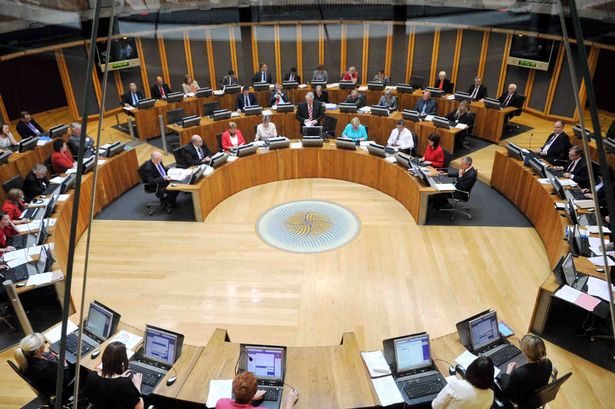Politics
Senedd Members clash over gender quota plans

PLANS to ensure equal representation of women in the Senedd have been described as a waste of time, energy and resources due to the likelihood of legal roadblocks.
Darren Millar criticised Welsh ministers for bringing forward the Senedd Cymru (Electoral Candidate Lists) bill despite concerns that it is not within the Welsh Parliament’s powers.
The Conservatives’ shadow constitution minister said plans for legally binding gender quotas in future Senedd elections would impact equalities law which is reserved to Westminster.
He told the chamber: “It is extraordinary that this Senedd is spending time, energy and resources focusing on a piece of legislation that it does not have the competence to be able to deliver, rather than focusing on the everyday concerns of the people of Wales.”
Mr Millar raised alarm about the potential costs, warning: “There’ll be significant legal challenges if this bill goes forward, not least, probably, in the Supreme Court.”
Elin Jones, the Senedd’s speaker or Llywydd, wrote to all MSs this week, setting out her view that the bill would not be within the Welsh Parliament’s powers.
Following legal advice, she wrote: “I considered the purpose and effect of the bill.
“While I accept the bill has the devolved purpose of making the Senedd a more effective legislature, in my view the bill also has the reserved purpose of equal opportunities.”
Ms Jones said the question of whether the bill is within the Senedd’s powers can only be definitively answered by the Supreme Court.
Her statement on legislative competence does not affect whether the bill can proceed, but it could later be referred to the Supreme Court by the UK Government’s attorney general.
Mr Millar raised concerns about the bill’s legislative process being cut short in the Senedd, with less time than usual for committee scrutiny and amendments.
He warned: “You’re going to chop down the opportunity for the committee to undertake its important work, in spite of the huge question marks over the competency of this Senedd.”
Challenged by the first minister about a lack of diversity on the Conservative benches, Mr Millar recognised political parties need to do more to address under-representation.
However, he argued people should be elected on the basis of merit.
He criticised a lack of a mandatory “zipping” process for candidate lists, saying: “The bill provides for lists to be entirely made up of women but not men. There’s no equality there.”
Describing the plans as groundbreaking, Jane Hutt, the member in charge of the bill, outlined the Welsh Government’s position in a statement to the Senedd on March 12.
Wales’ equality minister told the chamber: “The purpose of the bill is to establish a more effective Senedd, and, as such, the bill is within the Senedd’s competence.
“And I think that point about purpose is crucial to this.”
Ms Hutt quoted the Government of Wales Act 2006 as saying the question of whether a bill relates to a matter reserved to Westminster is determined by reference to its purpose.
“That’s the test about competence,” she said. “The purpose of this bill is to establish a more effective Senedd. Surely we can unite on that goal, to deliver a more effective Senedd?”
Ms Hutt added that a tight timetable is required to ensure the reforms are in place before the next Senedd election in 2026.
Heledd Fychan, for Plaid Cymru, said the bill would make the Senedd more representative of the people that it aims to represent and make the institution more effective.
She pointed out that less than a third of the 470 candidates put forward by political parties were women in the 2021 Senedd election.
Ms Fychan said: “Gender quotas for elections are commonplace around the world and are now used in more than 130 countries.
“Evidence from countries such as Spain, Belgium and Ireland shows that gender quotas can be an effective means of increasing the number of women elected to parliaments.
“The number of women in the parliaments of 11 EU countries that used gender quotas increased almost three times faster than in EU countries without quotas.”
Adam Price, the former Plaid Cymru leader, said: “Having fair and equal representation for all is a victory for all. That is the essence of what you are seeking to achieve with this bill.”
Mr Price said the bill would be a fundamental step forward and the same mechanism could be used in future to address the whole range of diversity.
Vikki Howells, a Labour MS who represents Cynon Valley, raised the example of Ireland, which introduced gender quotas in 2016.
Ms Howells, a former history teacher at St Cenydd Comprehensive in Caerphilly, said Ireland has since seen a 90% increase in the number of women candidates and a 44% rise in the number of women elected.
Huw Irranca-Davies, a fellow Labour backbencher, who chairs the legislation committee, suggested the issue of whether the bill is within Senedd powers is likely to be contested.
The Ogmore MS backed the policy’s intended aim, saying: “The progressive road is not always the easy road, but it is the right road.”
Community
Cilgerran Church in Wales school petition to be heard

A PETITION opposing proposed changes for a north Pembrokeshire school is to be heard by councillors later this week.
At last May’s meeting, Pembrokeshire County Council considered a report of the School Modernisation Working Group which outlined the findings of a review of education provision in the Preseli area.
A later July meeting backed a general consultation to discontinue Cilgerran Church in Wales Voluntary Controlled School, and to establish it as a 3-11 community school.
“In particular, the review considered the extent of surplus school places in the area, set against a significant decline in the pupil population,” the council in its consultation has said.
The consultation closed on January 30.
Hundreds have opposed the proposed changes, with a petition, on the council’s own website opposing the changes recently closing after gaining 391 signatures.
Any petition of more than 100 signatures triggers a debate at one of the council’s scrutiny committees, in the case of Cilgerran that debate taking place at Pembrokeshire County Council’s February 5 schools and learning overview and scrutiny committee.
The Cilgerran e-petition, created by Louise Williams, raised concerns including the school could become part of a federation, a loss of permanent head teacher on site, a shared head teacher would have to oversee several schools, loss of funding control and the ability to maintain the school’s current healthy and stable funding, and a loss of commitment to the church, in turn could impact on the school’s and pupils values, beliefs and cultural beliefs.
It said: “Ysgol Cilgerran VC school has strong links with the Church community in Cilgerran and we believe this will have a negative impact on the children who attend the school, the community of Cilgerran and the links between the two.
“We are proud of our school ethos and values which are strengthened by our links with the church. The school has close and strong relationships with our Church in Wales federation governors one of which is also our safeguarding governor.
“Our Church Federation governors work closely with the school and are regular visitors to the school and the children. They provide vital support and guidance to the school and have a positive impact on the Children’s education. We believe these links will be weakened by this proposal to remove our VC status and we believe this is an un-necessary action.”
The proposals for Cilgerran are part of a wide range of potential education changes in the county.
Two petitions, opposing the potential closures of Manorbier and Ysgol Clydau schools, were recently heard at full council and a further petition opposing the potential closure of Stepaside School has recently been launched, which has generated enough support to be heard at a future council meeting.
Crime
Welsh Lib Dems urge ministers to rethink rates relief for struggling pubs and cafés

Calls grow for Welsh Government to match support offered to English venues
THE WELSH LIBERAL DEMOCRATS have urged the Welsh Government to review its business rates policy, warning that scaling back support for pubs and hospitality risks further closures across towns and villages.
Party leader Jane Dodds, who represents Mid and West Wales in the Senedd Cymru, said ministers should act quickly to protect local venues after additional support for pubs and music venues was announced for England by the UK Government.
The measures announced by the Chancellor do not automatically apply in Wales, leaving uncertainty over whether similar help will be introduced here.
Hospitality businesses across Pembrokeshire and Carmarthenshire have already reported rising energy bills, higher wage costs and reduced footfall since the pandemic. From April, current business rates relief is expected to be reduced, a move the Liberal Democrats say could place Welsh firms at a disadvantage compared with competitors over the border.
Dodds said that pubs, cafés and restaurants form “the heart of our communities” and warned that withdrawing relief now would be “a serious mistake”.
She told the Senedd that support “cannot stop at pubs alone” and should extend to the wider hospitality sector, including restaurants and family venues that rely heavily on seasonal trade and tourism.
“When questioned, the First Minister said she needed to examine the details of the English package before committing to anything similar for Wales,” Dodds said. “Without urgent action, we risk losing viable, well-loved businesses that communities simply cannot afford to lose.”
The party is also calling for UK-wide action, including a temporary reduction in VAT for hospitality and tourism, funded by a windfall tax on large banks.
However, Welsh Government sources have previously argued that decisions on rates relief must be balanced against pressures on public finances, with ministers required to prioritise health, education and other frontline services within a fixed budget. They have said any additional support would need to be affordable and targeted.
Industry bodies have echoed concerns about the challenges facing the sector. Trade groups say many independent pubs and cafés continue to operate on tight margins, particularly in rural areas where they serve as community hubs as well as businesses.
Local operators say clarity is now key, with decisions on staffing, stock and opening hours often planned months in advance.
With the next financial year approaching, hospitality owners will be watching closely to see whether Wales mirrors England’s support – or leaves businesses to absorb the extra costs alone.
international news
Mandelson quits Labour over Epstein controversy

Former cabinet minister says stepping down is ‘in best interests of the party’ as questions raised over historic payments
LORD MANDLESON has resigned his membership of the Labour Party, saying he does not want to cause “further embarrassment” following renewed controversy over his past links to convicted sex offender Jeffrey Epstein.
The former cabinet minister and one-time UK ambassador to the United States confirmed his decision in a letter to Labour’s general secretary after fresh documents released by the US Department of Justice appeared to reference him in connection with Epstein’s finances.
The files suggest that three payments of $25,000 — totalling $75,000, about £55,000 at today’s exchange rates — were allegedly made to Peter Mandelson in 2003 and 2004.
Lord Mandelson said he had “no record or recollection” of the transactions and believes the allegations may be false, but intends to investigate the matter himself.
In his resignation letter, he wrote that he felt “regretful and sorry” to be linked again to what he described as the “understandable furore” surrounding Epstein.
He added that stepping down from party membership was the responsible course of action while he reviewed the claims.
“I do not wish to cause further embarrassment to the Labour Party,” he said. “I have dedicated my life to the values and success of the party and believe I am acting in its best interests.”
Ambassador role ended
Lord Mandelson had been appointed the UK’s ambassador to Washington by Prime Minister Keir Starmer in December 2024.
However, he was removed from the post last year after earlier revelations about his past friendship and contact with Epstein, including emails showing communication after the financier’s 2008 conviction.
The latest release of files has also included photographs said to show Lord Mandelson alongside an unidentified woman. He said he could not place the location or circumstances of the images.
There is no suggestion that appearing in the documents or photographs indicates criminal wrongdoing.
‘Deep regret’
Earlier this weekend, Lord Mandelson reiterated his regret for ever having known Epstein and apologised “unequivocally” to the women and girls who suffered abuse.
“I want to repeat my apology to the women and girls whose voices should have been heard long before now,” he said.
Epstein died in prison in 2019 while awaiting trial on sex trafficking charges, but investigations into his network of associates continue to generate political fallout on both sides of the Atlantic.
Labour has not yet issued a detailed statement beyond confirming it had received Lord Mandelson’s resignation.

-

 Health5 days ago
Health5 days agoConsultation reveals lack of public trust in health board
-

 News6 days ago
News6 days agoCaldey still unsafe, survivors warn — despite Abbey’s reform claims
-

 Community6 days ago
Community6 days agoPembrokeshire students speak at national Holocaust Memorial Day event
-

 News3 hours ago
News3 hours agoPrincess of Wales visits historic Pembrokeshire woollen mill
-

 News6 days ago
News6 days agoKurtz raises Gumfreston flooding in the Senedd as petition deadline nears
-

 Crime4 days ago
Crime4 days agoPembroke man accused of child sex offences sent to Swansea Crown Court
-

 Education6 days ago
Education6 days ago‘Vulnerable teen’ questioned by police at Milford Haven School
-

 Education6 days ago
Education6 days agoAttendance concerns at Milford School reflect wider issue raised at the Senedd





























